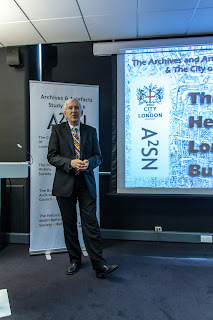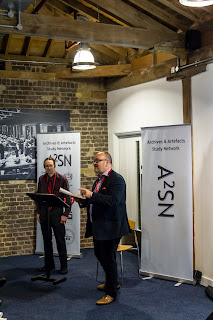In 2011 the authors became increasingly concerned that in the UK and Europe the financial climate and public sector cuts were impinging on the museum, libraries and archives sector.
In a paper, given at the Conference of the International Association for the History of Transport, Traffic and Mobility (T2M), in Berlin, November 2011, we began to express the need for all those who use archives and artefacts, whatever the formal and informal definitions of those categories may be, to work together. We suggested that we urgently need to address ways in which the Academy and the Amateurs can better use their knowledge to protect the business and transport and other heritage collections of whatever sort.
Much is being done by societies of enthusiasts, to maintain, archive, document, and preserve the transport and other heritage legacies world wide. In the UK some of these societies have taken advantage of Apprenticeship Schemes and are training young people to continue the work. In particular we note that “Modern Image” railway transport preservation, aviation, computer and road vehicle heritage enthusiasts, have a younger age profile. But the pool of professionally experienced volunteers in all fields is, almost by definition, ageing and action must be taken, particularly to maintain the records of transport and other companies.
Some of the questions we debated in our paper are as follows. How can the community of amateur historians and enthusiasts work with those in the academic/education community to ensure that these records will be available for future generations to use? Academics and amateurs can no longer assume the availability of source material ‘as of right’. How best can the community of archivists, enthusiasts and academics engage to facilitate the use of records and ensure ‘private’ collections are kept safe? Can we spread the use of such records to include school education? The work of the Education and Outreach team at the UK National Archives (TNA) indicates that we can.
The survival of records and artefacts is best ensured by their use, NOT just by the academy but in the wider educational community. The history of business, technology, transport and mobility is, we contend, an effective tool to encourage the young to think about, engage with and possibly enter the professions, occupations and crafts associated with them as well as providing ongoing satisfaction for the many who engage in research either for pleasure or as a part of the academic world.
Crucially we believe that we need to establish how best we can engage with the wider public and tell the engaging stories of business and technology, thus allowing archives and artefacts to be used more widely. If any doubt the power of mass participation, we suggest that the changes in structure and operations at the TNA to accommodate the numbers of ordinary people, companies and organisations wishing to use the records to research family history is an excellent case in point.
 |
| The former LMS School of Transport in Derby, opening venue of the 2012 Workshop. Now called the Derby Conference Centre it provides wonderful accommodation and conference facilities. |
These ideas led to us persuading our respective organisations to support the running of a Workshop in Derby, during November, 2012. At the beginning we jointly thought that possibly twenty or so people from amongst those that we knew might support us. We were delighted to find that within a few days of the Workshop being announced the bookings flooded in. Forty-eight people gathered for the opening session and we were delighted. Eminent speakers, some of whom traveled long distances, also agreed to address the gathering and give us of their expertise.
.jpg) |
| Kiara King of the Ballast Trust speaking at the Derby Workshop |
Not only was the Workshop successful in bringing together a number of like minds from a range of disciplines, but it bought to light events of which we were not aware before. Significant archives are being digitised and made available via the Internet and we believe, that as long as the original paper or electronic record is preserved in deep storage, that can only be positive. Examples are numerous, though as yet not by any means complete, however we feel that we can point in particular to the huge progress made by Network Rail (the UK’s Rail Infrastructure Provider) in beginning to make their vast archive available via their website. Another group that has caught our eye is the Great Eastern Railway Society (GERS), who as volunteers have funded the digitisation of the Staff Magazines of the Great Eastern and London North Eastern Railway Companies as well as that of British Rail Eastern Region. These magazines are now available for purchase as word searchable pdf files on DVDs which the GERS have had produced and are a wonderful source for British transport historians (www.gersociety.org.uk). There are many other examples in other fields and perhaps it is erroneous to single out these two, but they are within our joint experience. We are aware that the above examples are from transport history, A2SN is however about about much more than that. Maritime, Postal, Business, Economic History, as well as Industrial Archaeology, are all subjects we continue to explore
One of the 2012 Workshop delegates, John Scott, Chairman of the Culture, Heritage & Libraries Committee of the City of London Corporation, was sufficiently impressed that he gave impetus, support and aid to a second conference. The Beating Heart of London’s Business which was held at the London Metropolitan Archives, the Museum of London Docklands on 12th and 13th April, 2013, with a Guildhall Reception hosted by the City of London Corporation and addressed by Kenneth Ayres, Chief Commoner of the City of London. The Postal History Society has also become one of our supporting organisations.
 |
| John Scott speaking at the London Conference |
We have also progressed our group of colleagues and from a group without title, we have now become the Archives and Artefacts Study Network (A2SN). A2SN is not yet another organisation, it is a loose group of people from a wide variety of disciplines who are willing to explore the concept, that amateurs, academics, archivists, antiquarians and many others study, use archive and conserve prime source historical material in whatever form it exists. A2SN simply provides forums where people can meet; extending their thinking and learning by talking to, and working with others whom, in the normal course of pursuing their occupation or their hobby, they might not meet.
One of our purposes is to expand our experience, so if any of you would like to join in, and it is free, please talk to us and/or attend our workshops and conferences. The next one will be in Leeds on 16, 17 May, 2014 at Armley Industrial Museum. Most importantly please let us know of projects, people or societies that you have come across and think are innovative so that we can help them gain a wider audience. We are developing a web presence, but for now contact academic-liaison@hmrs.org.uk































